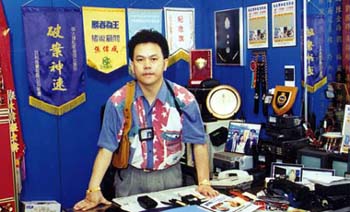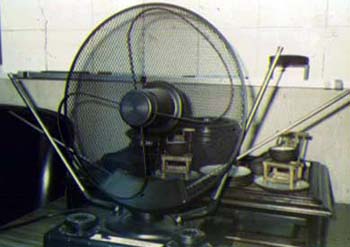|
Private eyes Detective's journey through tactics and adventures By Vivian To |
Courtesy of Mr. Cheung |
|
Mr. Cheung’s agency provides several different types of service for clients. “Most of our clients are women who hire us to collect evidence of adultery on their husbands. “With such evidence, they can win in divorce cases and seek alimony and right of custody (of children). “Rich clients from the upper classes sometimes even ask us to check up on the backgrounds of their future daughters-in-law and the people mixing with their children,” he added. Mr. Cheung and his staff also help companies find out whether their employees have divulged commercial secrets to their rivals — or have lured customers away when they left. Besides civil cases, finding missing people, rescuing kidnap victims, recalling debts and protecting threatened clients are all areas in which Mr. Cheung serves customers. “However, not everyone can afford to hire us,” said Mr. Cheung. “The charges may be too high for most people.” The standard charge by Mr. Cheung’s agency is $144,000 for a 3-day investigation, excluding overtime charge. Said Mr. Leung Hoi-ping, owner of another private detective agency: “If we fail to complete the task, we’ll return all the money.” Sometimes, other investigators privately ask private eyes for help. “Some (investigators) rely on us to find out passwords to enter underground brothels and drug dens,” admitted one. The very first thing a private detective does after being hired is to gather information. Thus “bugging”, or secretly listening to conversations, is an essential skill for a detective. Said Mr. Cheung: “By listening to conversations, we know when and where the target will be going. “This enables us to pick the best time to wait for him and make better manoeuvre.” After knowing the possible whereabouts of the target, it is time for real action. If the target drives, Mr. Cheung will send a team of six detectives in two cars and one motorbike to follow. “It is extremely difficult to follow the targets again once they have been alerted (to our presence),” he explained. “We’d rather plan for another operation then.” To collect evidence, private detectives often make use of high-tech devices such as pen-like or calculator-like “detectaphones”, miniature cameras and video recorders hidden in air fresheners. “We usually buy gadgets from the United States or Japan because they are more advanced, but we also make our own to accommodate specific environments,” said Mr. Leung. |
Vivian To can be used to record all the activities taking place in a room. |
|
Since private detectives have to perform risky and demanding tasks, the entrance requirements to the profession are strict. “We expect our staff to have basic knowledge about photography, driving and legal matters,” said Mr. Cheung. “But most importantly, they must be highly flexible and adaptable.” The turnover rate in this profession is high indeed, although the pay is good. “There’s always a gap between imagination and reality,” said Mr. Leung. “Our job isn’t as exciting as people think. We spend most of the time waiting for targets and writing reports.” The hard work and unfavourable working hours also account for this trend, according to Mr. Cheung. In order to make their work go smoothly, some private detectives have a few tricks. For example, one detective, whose identity is being withheld here, claimed he owns an identity card that resembles those of the police to confuse outsiders such as taxi drivers. Also, when he leaves his car unattended, he puts a fake mileage record book used by government departments in a conspicuous place. “Then the police will mistake the car as one of their colleagues’ and won’t issue a fine to me,” said he. “When we’re in a hurry, we simply put a siren on top of the car and other drivers will give way. “Once even the traffic police opened up the road for us!” he said, laughing. When asked whether he thinks these practices violate the law, the detective downplayed the legal significance of such activities. “What we’ve done are only minor offences,” said he. “It’s just like gambling and evading tax. These are no big deal at all.” However, lawyer Cheng Kar-foo said private detectives in Hong Kong are “walking on a thin wire” by engaging in such activities. Said he: “It’s all right if these detectives’ disguises are not unmasked and if the targets don’t know they’re being traced. “But if they’re found breaking into private premises without permission, causing disturbances, stealing or destroying private property, they’ll probably face prosecution.” Whether or not privacy is infringed is debatable. “But giving information about the targets to a third party or disclosing it publicly is absolutely wrong,” he said. |
 Passion is key to love
Passion is key to love
January 1998
[Editorial] [Letters] [Answer] [News] [Social] [Photo] [Culture] [Education] [Channels] [Science] [Celebrity]
Comments Editor-in-Chief Electronic Editor